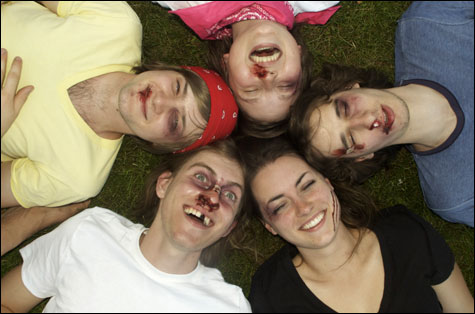
THRIFT SCORE: A uke, a glock, a plastic wood-block thingy, a trumpet, a tambourine, a megaphone, shakers — anything in the bargain bin is a potential accessory. |
Ask the same boring question enough times to enough people and you’ll get a not-so-boring answer. Posterity mandates the “How did your band start?” question, despite the foregone conclusion of its near-certain negligibility, but, golly, the story behind the Toothaches reads like a tale decreed by the cosmos, or some such shit.
“He approached me and said, ‘I figure since we’re walking down the street in the same direction, we should get to know each other. My name’s Zimmy.’ He started talking about starting a band to take over the world. I really wanted to be in his band but didn’t say anything about it. Then we parted ways. We didn’t exchange cellphone numbers, so I looked for him for two months, couldn’t find him, and gave up. Then I was getting on the train at Hynes Auditorium, he was there, and we both got off at the same stop, which was just weird. I asked, ‘Would you like to get a drink with me?’ He said, ‘I thought you’d never ask.” Then we became platonic life partners and started writing music.”
Now, Rose Blakelock and guitarist Zimmy Ayer have matching tooth tattoos on their inner forearms. Aw.
Blakelock tells me this story in front of the Sound Museum, Allston’s labyrinthine jam-space multiplex. About a half-hour later, inside, under the Christmas lights dangling from the ceiling in their rehearsal room, her band play a few Be-Your-Own-Pet-with-a-glockenspiel-style tunes, demonstrating that they play rock and roll now and that their syrupy-Kimya Dawson-if-she-sang-well æsthetic from months ago is out the window. There is an elegant simplicity to the A Month of Sundays EP, that phase’s foremost artifact, and you have a black heart and no soul if “I’m hungover and over again” doesn’t make you smile. Maybe it would’ve been prudent to stick with what was working. Then again, if something else also works . . .
“We’ve always been working with what we have,” says Blakelock. “We never wanted to be a twee band, but there were three of us, we didn’t have a lot of money, none of us could play drums, so we’re like, ‘We bought this ukulele for $30. I’m going to learn how to play it. We got this glockenspiel for $30. We’re going to learn how to play it.”
A uke, a glock, a plastic wood-block thingy, a trumpet, a tambourine, a megaphone, shakers, matching outfits, Mariah Carey covers (“One of the best pop artists of our time,” says Ayer) — anything in the bargain bin is a potential accessory, but there’s an unsystematic methodology at the foundation of the ‘Aches.’ Blakelock met Monica Hubbell, who completes the triple vocal harmonies, at a lingerie party, and soon they bonded over karaoke. Ayer recruited a former bagel-joint co-worker (also ex–Wonderful Spell), Andrew Zizik, to play drums. When Zizik had difficulty keeping the beat while inebriated, he switched to bass and sought out Johnny Jannetty, who can absolutely play drums and drink heavily at the same time, even while confined to a child-sized drum kit — his regrettable but hilarious fate having been sealed in the early stage of his Toothaches career.